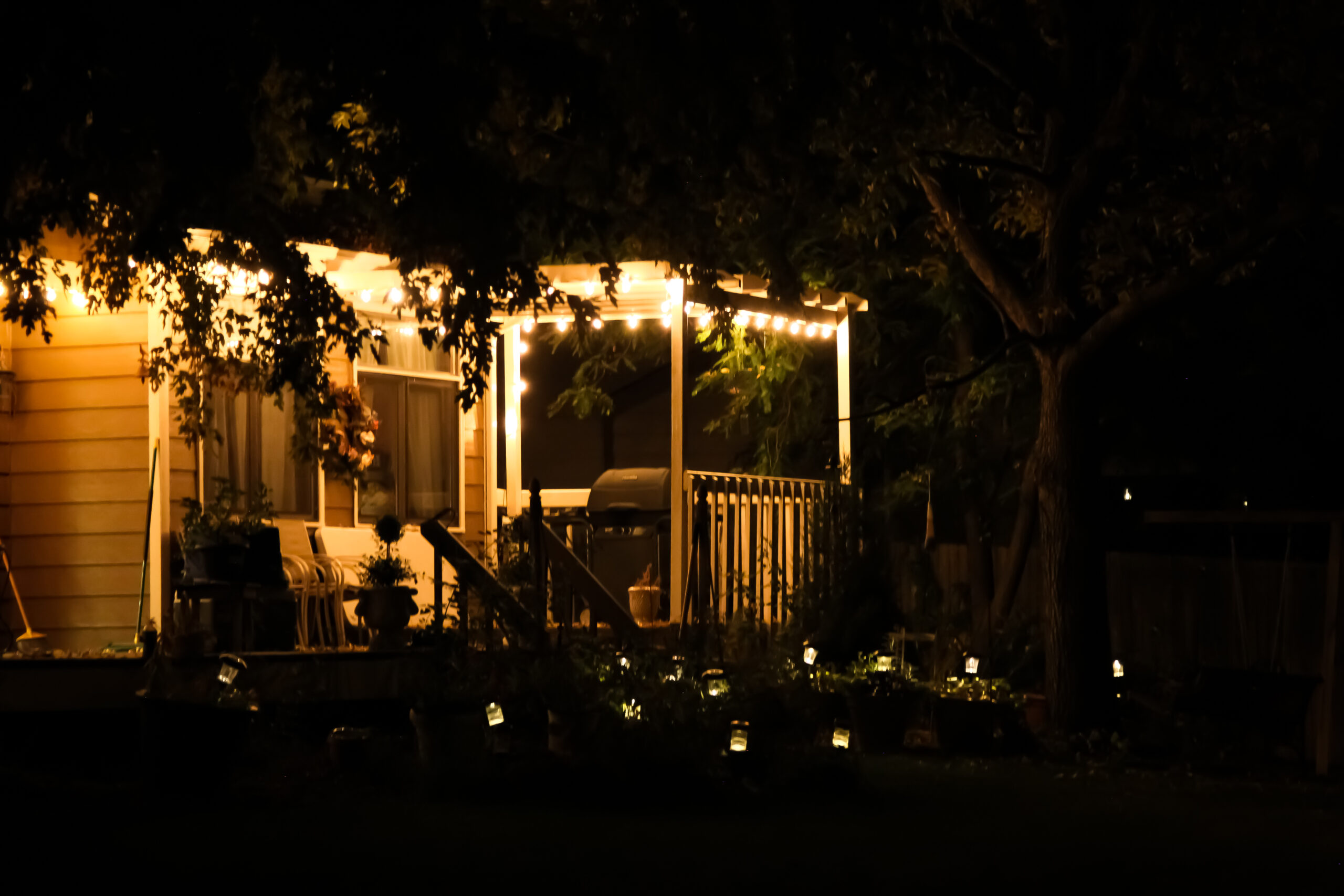The summer before my junior year of high school, I was helping a friend’s family paint their house. I had no fear of heights at the time, so standing on scaffolding, painting the trim on the second story, wasn’t a big deal. We started in the morning and worked our way around in the shade of the fir trees. The house faced away from the mountains on a sloping hill, and my friend’s dad was laying boards on the scaffolding high above the ground as we went along.
I was in full teenager-hood at the time, so it’s likely I ignored some warnings and good instructions. I probably wasn’t a very good painter to begin with, but I had a bucket of slate blue paint and a paintbrush in my hand when I walked onto a board that was not yet secure.
I remember the feeling of all my organs climbing into my chest, as if my body was falling faster than my insides could handle. I remember landing on the slope of the hill in a sitting position, with my knees up and thinking that my back really hurt. I remember slate blue paint on everything and standing myself up, realizing my back pain and the paint in my hair weren’t the main problems. The most immediate issue was that I had landed on an iron grounding rod which punctured my left thigh.
I don’t remember there being any blood, but there was so much paint. Someone put a towel or a sheet over the front seat of my mom’s car, and she drove me to the hospital. Thankfully the rod had punctured the meatiest part of my thigh, and because I landed with my knees up, the wound was only about four inches deep. I came home from the hospital with no broken bones or major injuries, just a few stitches, crutches, and a drain tube hanging out of my leg.
Of all the ways that event could have ended—a broken back, a punctured spine, speared organs—I escaped with just a scar and a story to tell.
![]()
The world punctures us and leaves its mark, and for some reason God created us as stories wearing flesh—scarred humans, spoken into being, telling tales.
When Thomas needed proof of the resurrected Messiah, it was the mark of Christ’s wounds that convinced him this was indeed his Friend, risen from the grave. He didn’t believe the testimony of his friends, and Jesus admonished him, “Don’t be faithless, but believe.” [1] Thomas needed some physical manifestation of an unbelievable thing—Christ, risen—and Christ came and gave him flesh and scars.
When Thomas doesn’t believe his friends’ story, I get it. He had seen the wounds that led to Christ’s death, and he knew Jesus to be fully human. When my friends and family don’t believe, I understand. I remember recounting the gospel to someone who truly wanted to believe, and thinking to myself: This is nuts. This story is the wackiest of wacky tales. We have to detach from reality to believe this.
The gospel has to come to us in terms we understand, at some point. Good news has to become real, embodied, scarred from living, and with a story to tell.
When Jesus invites Thomas to put his fingers on the scars, to put his hand in His riven side, He is allowing His humanity to still be present in His risen Self. He is still the Jesus who was wounded for us. He is still the God who put on a flesh that is soft and exposed it to a world that is sharp. Jesus took Thomas directly to the place of wounding, because that is what Thomas needed for proof. Scars sealed the deal.
I am among the blessed, according to Jesus, because I have not seen and yet believe. I have not put my finger on the wound of Christ, have not made a meal for a dead man to eat. I have a gift of faith and have never really doubted the life, death, and resurrection of Jesus—it’s a wacky story but I’m standing on a spinning planet suspended by invisible forces in a vast and ever-expanding universe, so I can believe in things I don’t fully understand or even see. In truth, I want God to be beyond my comprehension. It seems necessary for the ways of the Creator to be far above the minds of the creation.
I still have doubts, though, and they come in the form of His specific attention. I doubt Christ’s willingness to be intentional and attentive to every person’s singularity, and I question whether He is just good en masse, to all of us, in a big, sweeping motion of His nail-scarred hands. I think maybe He cares in general about all the birds of the air and so, obviously, for me, but sparrows hit my window and lay dead in the yard, to be carried off by my dog or the neighbor’s cat, and I don’t see the intimate care in that. Billions of birds. Billions of people. If you care, do something.
Mary and Martha, the sisters of Lazarus, each lobbed a similar accusation to Jesus after their brother was buried. At different times and in separate locations they each said, “Lord, if You had been here, my brother would not have died.” It would seem they had conferred on this beforehand, probably through tears at the bedside of their brother. If Jesus had been here; if He had cared enough; if He was good. They misunderstood His power and His plan, but they understood the importance of His presence.
When I try to convince myself of all the tangible ways God is good, specifically to me, I have stories—some represented by scars—to remember. But I also have beauty as testimony.
I have moments frozen in my memory that I cannot put words to or recreate—almost a future memory, a promise I can feel before it’s fulfilled—and I know this as the hope of glory, Christ in me. Christ, embodied in my own scarred flesh, being present in me.
What we embody is pure mystery and absolute presence. What we hope for is not what we see, and this helps me handle the broken birds in my yard and the deeper aches of grief that come with their own invisible scars.
We are not embodied by Christ to become tools used by Him. I am convinced this is not the way of the gospel. Carrying His Spirit in us is a gift of presence, of with-ness and witness to all His goodness, and it is more beautiful and less utilitarian than we are sometimes encouraged to believe. It is enough that He is with us, but we don’t always realize it until we are wounded, ourselves.
What our suffering allows are stories of His intimate care and goodness, even when He doesn’t swoop in and resurrect our loves. We all lose the dreams we think make for a good life, the things we think would signal to the world that God is good. Tragedy strikes and people respond as they will, but we always have His presence with us. That maybe doesn’t sound like enough. We would like to be rescued. We want proof of His goodness. We want a way around suffering. Sometimes He gives scars, instead.
![]()
I coach volleyball at the public high school in our small town. A couple weeks ago I asked the team to each pick one scar and tell the story of it, hoping for a little team bonding and levity after a workout. They were excellent storytellers, choosing just enough backstory and humor to bring us into their experiences and showing us the scars they’ve earned from living. I shared my scar, too.
Last week, one of the girls was stopped in road construction on her way home from practice when a drunk driver rear-ended her at full speed, shoving her car into the vehicle in front of her. She was alone, and in the pictures of the accident you can see that the driver’s seat was the only intact part of her car. She walked away without even a concussion, just a few cuts and bruises and very sore muscles. In a text message she said to me, “The Lord was definitely on my side.”
If we had lost her it would have been an unrecoverable tragedy, as it always is when someone you love dies. It would have devastated our community, our tiny school, and most of all, her family. Many of us would be questioning God.
Instead, she has scars and a story—the gift of His presence.
![]()
[1] John 20:27, CSB
The featured image is courtesy of Lancia E. Smith and is used with her glad permission for Cultivating.
Tresta Payne learned to appreciate the beauty of God from the landscape of the Pacific Northwest, where she lives with her husband and four children. She builds her own MFA in creative writing through homeschooling her children and tutoring others, finding every excuse to learn and read and grow. After twenty years of homeschooling she is ready for someone to hand her that degree. She enjoys a good, deep discussion with a balance of differing opinions, and works out her own thoughts in writing. Tresta walks a lot on the wild country roads around her home, with her dog and her thoughts and the nearness of God to keep her company.
Leave a Reply
A Field Guide to Cultivating ~ Essentials to Cultivating a Whole Life, Rooted in Christ, and Flourishing in Fellowship
Enjoy our gift to you as our Welcome to Cultivating! Discover the purpose of The Cultivating Project, and how you might find a "What, you too?" experience here with this fellowship of makers!


The story at the end begs the question…what if she had not been spared? would God still have “been on my side?” My friend related a story of families being interviewed after an F5 tornado. One family whose house was not touched said “God was good to us.” The family next to them lost everything,. Was God still good to them? Over the years as I struggled with God’s goodness, I gradually came to a place where I can acknowledge God’s goodness because he is goodness himself, and sometimes his goodness feels good. What is also true is that sometimes it’s hard to believe he is still “good” when it feels so bad. I say “God’s goodness felt good today.”
Carol, this is something I always struggle with, too, and the way you’ve framed it is helpful. I wrote about it on my Substack in February of this year:”…I don’t doubt God’s favor to His people or question His right to allow suffering and not puppeteer us through life. I just see a grieving world and hesitate to party in front of them. Millions are suffering while the one is spared, and that’s hard.”
He is goodness, Himself, and sometimes we feel that goodness in a way that makes sense to our temporal brains. “God’s goodness felt good today,” is a true and beautiful rendering of the nuance. Thank you, Carol.